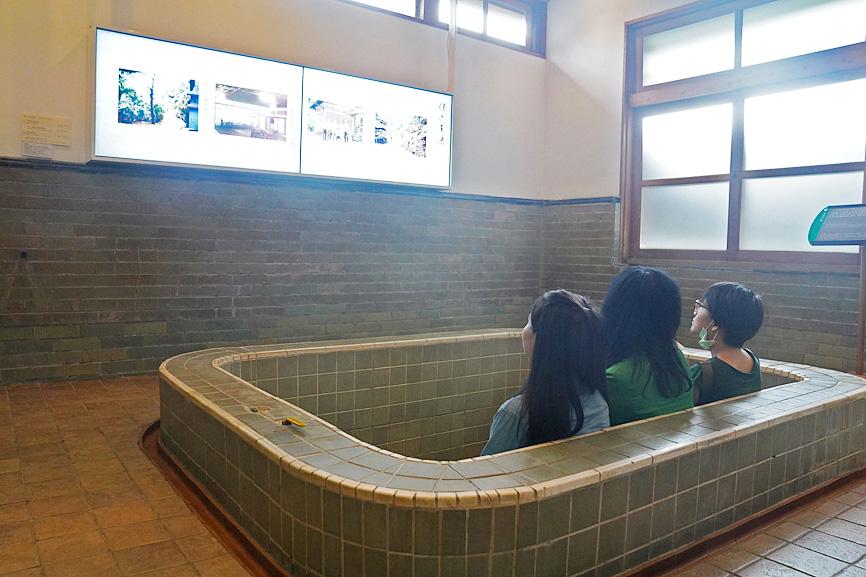Sitting on a hillside in Taipei’s Bei-tou (北投), a century-old district home to the nation’s oldest hot springs community, a two-story, wooden Japanese-style building has been a permanent feature as long as anyone can remember.
The Beitou Museum is set to celebrate its 100th anniversary next year, and museum director Saalih Lee (李莎莉) has said that she hopes to breathe new life into the old building.
Built in 1921, the structure was initially the Kazen Hotel, colonial Taiwan’s most luxurious hot springs resort, Lee said.

Photo: CNA
“This building celebrates the wabi-sabi aesthetic,” Lee said, referring to a traditional Japanese worldview centered on the acceptance of transience and imperfection.
Whether an unequal leaf door decorated with cloudy glass, a deserted bathhouse covered in green tiles, or a hidden Zen garden in the building’s central yard, she hopes that visitors would appreciate the museum building for its original style, Lee said.
In its early years, the building was often used by the Japanese military, and at one point, it was a guesthouse for kamikaze pilots, said Lee, who has been museum director for 16 years.
The building changed hands after 1945, became a private museum in 1984 and was designated an historic site by the Taipei City Government in 1998, she said.
Despite its age, the 2,500m2 structure remains full of vitality and offers a combination of cultural exhibitions, dining events and recreational activities, such as fashion shows, Lee said.
Having won the inaugural prize for preserving cultural heritage from the city government last month, the museum is a centerpiece of Taipei’s efforts to promote the idea of museums without walls, Taipei Deputy Mayor Tsai Ping-kun (蔡炳坤) said.
“Taipei is not only a bustling city, but also a city that breathes,” Tsai said.
Through places such as the Beitou Museum, which is largely based on local participation and aims to enhance the welfare and development of local communities, the city has many stories to tell about its history, he said, adding that the museum helps raise public awareness about the importance of Taipei’s cultural heritage.
Beitou is the perfect place for the museum to thrive thanks to its relatively early development in the nation’s history, owing to the hot springs, according to the city government Web site.
The area is also home to historic sites such as the Beitou Hot Spring Museum, Plum Garden, Grass Mountain Chateau and Taipei Beitou Public Assembly Hall, Lee said.
With the cultural sites increasingly offering educational resources and promoting their activities better, Lee said that she hopes that the number of visitors to the museum, currently 50,000 each year, would increase in coming years.

An essay competition jointly organized by a local writing society and a publisher affiliated with the Chinese Communist Party (CCP) might have contravened the Act Governing Relations Between the People of the Taiwan Area and the Mainland Area (臺灣地區與大陸地區人民關係條例), the Mainland Affairs Council (MAC) said on Thursday. “In this case, the partner organization is clearly an agency under the CCP’s Fujian Provincial Committee,” MAC Deputy Minister and spokesperson Liang Wen-chieh (梁文傑) said at a news briefing in Taipei. “It also involves bringing Taiwanese students to China with all-expenses-paid arrangements to attend award ceremonies and camps,” Liang said. Those two “characteristics” are typically sufficient

A magnitude 5.9 earthquake that struck about 33km off the coast of Hualien City was the "main shock" in a series of quakes in the area, with aftershocks expected over the next three days, the Central Weather Administration (CWA) said yesterday. Prior to the magnitude 5.9 quake shaking most of Taiwan at 6:53pm yesterday, six other earthquakes stronger than a magnitude of 4, starting with a magnitude 5.5 quake at 6:09pm, occurred in the area. CWA Seismological Center Director Wu Chien-fu (吳健富) confirmed that the quakes were all part of the same series and that the magnitude 5.5 temblor was

The brilliant blue waters, thick foliage and bucolic atmosphere on this seemingly idyllic archipelago deep in the Pacific Ocean belie the key role it now plays in a titanic geopolitical struggle. Palau is again on the front line as China, and the US and its allies prepare their forces in an intensifying contest for control over the Asia-Pacific region. The democratic nation of just 17,000 people hosts US-controlled airstrips and soon-to-be-completed radar installations that the US military describes as “critical” to monitoring vast swathes of water and airspace. It is also a key piece of the second island chain, a string of

The Central Weather Administration has issued a heat alert for southeastern Taiwan, warning of temperatures as high as 36°C today, while alerting some coastal areas of strong winds later in the day. Kaohsiung’s Neimen District (內門) and Pingtung County’s Neipu Township (內埔) are under an orange heat alert, which warns of temperatures as high as 36°C for three consecutive days, the CWA said, citing southwest winds. The heat would also extend to Tainan’s Nansi (楠西) and Yujing (玉井) districts, as well as Pingtung’s Gaoshu (高樹), Yanpu (鹽埔) and Majia (瑪家) townships, it said, forecasting highs of up to 36°C in those areas